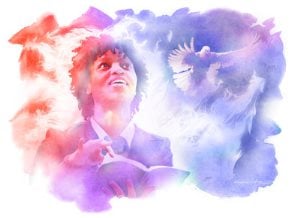Inside Story: The Disobedient Daughter
Irunga stepped outside the mud hut that was her father’s home.
She had hoped that he would understand that becoming a Christian didn’t mean she was rejecting her family’s traditions. She loved her family, but now God was more important.
Irunga is a Herero, a tribal people living in northern Namibia. She grew up watching her grandfather sit before the holy fire and talk to the ancestors, asking them to tell God the family’s concerns.
When she was 10, she went to live with her uncle and attend school in the little town nearest to her family’s settlement. While studying, she attended a Protestant church and accepted Jesus as her Savior. She knew that her family would be unhappy, but when her grandfather accused her of deserting their culture, she was deeply hurt. They called her a disobedient daughter. Saddened, Irunga returned to town.
A friend introduced her to some Adventist missionaries and their interpreter, Kapitango. Irunga enjoyed talking with the missionaries, but she had no intention of becoming an Adventist. However, as her friendship with Kapitango grew, so did her interest in his faith. In time she accepted the Adventist faith, and the young couple decided to marry. But marriage in Irunga’s culture is complicated, and parents often take years to decide to allow their young people to marry.
Kapitango’s parents asked Irunga’s parents for permission for the couple to marry, and they agreed. But just before the wedding, they withdrew their permission. Kapitango and Irunga decided to marry anyway.
Religion continues to be a wedge between Irunga and her family, who still refuse to listen to her testimony. But Irunga hopes that one day they will share her love for Jesus. She is her village’s only contact with Adventists.
Irunga and her pastor-husband work with a group of Adventist missionaries to reach the Herero and Himba people of Namibia. They are developing Bible stories told in the oral traditions of her people. The stories, recorded onto MP3 players, are making a difference in people’s lives, and Irunga hopes that one day soon they will reach her own family.
Part of a recent Thirteenth Sabbath Offering has gone to help make these MP3 players available to more Himba and Herero people, so that they can hear for themselves that God is not distant or uncaring, but loving and forgiving.
Thank you for giving to mission and the Thirteenth Sabbath Offering and making it possible for others to hear the story of salvation for themselves.
Irunga Ndjamba shares her faith in northern Namibia.
Produced by the General Conference Office of Adventist Mission. email: in**@**************on.org website: www.adventistmission.org


If different parts of the body have different structures it is a strength to the body. As it is, we have many structures in our church. In China there are several, none of which are like what we have in America. In the Netherlands the structure for voting policy is very different than what we have here. Just as a foot needs a different structure for the environment it is in and the job it needs to do so different parts of the church need to be different. As hands need gloves and feet need shoes so different fields need different support. And though both hands need gloves for protection in difficult jobs the glove for a left hand if forced onto a right hand will majorly hamper its ability to function. Just because a unit of the church is doing something different, it does not mean they are “going their own way” . Just as God allowed major differences in Acts 15 so we can too. Just as some of the early leaders’ opposition to varying practices cut short Paul’s ministry so we may in our insistence on a single structure cut short those God meant to help us finish the work He gave us to do.